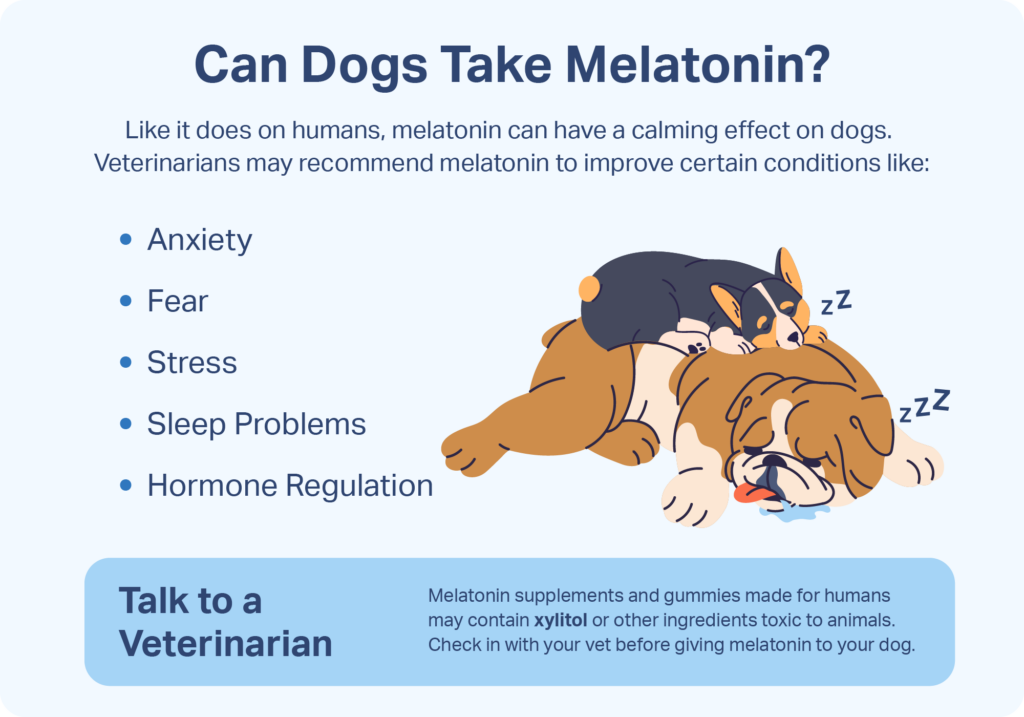Can Dogs Have Melatonin?
- Melatonin can be used for dogs with sleep issues, especially those related to anxiety.
- Consult your vet before giving melatonin to your dog to determine the appropriate dosage.
- Watch for potential side effects, and never use human melatonin for dogs.
Like humans, dogs have circadian rhythms , characterized by being more active during the day and sleeping during the night. Dogs also experience sleep issues that can disrupt sleep, like chronic pain and cognitive issues .
With these similarities, dog owners might wonder if the melatonin supplements they take for sleep could also help their beloved pet. While the research on the efficacy and use of melatonin with dogs is limited, there is some promising information about helping dogs get the rest they need.
What Is Melatonin?
Melatonin is a naturally occurring hormone released in our brains in the evening to signal to our body that it’s time for sleep. Synthetic melatonin is available as an over-the-counter supplement in pill or chewable tablet form, and as teas and tinctures. It’s relatively affordable and often a first step in treating insomnia and other sleep-related issues.
How Does Melatonin Affect Dogs?
Melatonin seems to have a calming effect on dogs, like it does on humans. In a study of healthy dogs getting ready for a surgery, those that were given melatonin before the procedure were more calm and required less initial anesthesia .
In addition to calming effects, melatonin has been shown to be beneficial in other ways for canines. In another study of dogs, those who were administered melatonin experienced less initial anesthesia compared to those that did not take melatonin. In a separate study, dogs that were given melatonin after castration were better able to regulate hormones that are usually out of balance after castration.

Is Melatonin Safe for Dogs?
According to the American Society for the Prevention of Cruelty to Animals (ASPCA), melatonin is a safe supplement to give to your dog. Melatonin has little risk for harmful side effects . The most common side effect is lethargy upon waking the next morning. However, please ensure that you are purchasing melatonin free of added fillers or coatings that could be harmful, or the sweetener xylitol, which can hurt dogs.
While there is little risk of serious side effects from melatonin, it may interact with other medications your dog is on. Talk to your veterinarian before starting your dog on any new supplements, melatonin included.

How Much Melatonin Should You Give Your Dog?
The literature is limited when it comes to the appropriate amount of melatonin to give your dog. Depending on body weight, the appropriate dose for dogs with sleeping disorders is between 0.5 and 5 milligrams .
| Dog Size | Weight | Melatonin Dosage |
|---|---|---|
| Extra Small | Less than 5 kilograms | 0.5 milligrams every 8 hours |
| Small | 5 to 15 kilograms | 0.5 – 1.5 milligrams every 8 hours |
| Medium | 15 to 30 kilograms | 1.5 – 3 milligrams every 8 hours |
| Large | 30 to 50 kilograms | 3 – 5 milligrams every 8 hours |
| Extra Large | Over 50 kilograms | 3 – 5 milligrams every 8 hours |
Talking to your veterinarian about the right amount for your dog based on their age, weight, and any other health issues or medications is your best course of action. If your veterinarian recommends giving your dog melatonin, make sure you purchase it in the right amount. Supplement options that are preweighed allow you to easily administer the correct dosage according to your veterinarian.
When Should You Give Your Dog Melatonin?
If you’re going to use melatonin to help your dog relax before bed or feel less anxiety before a procedure, administer the appropriate dose approximately two hours before bedtime or veterinary appointment. This time frame allows for the melatonin to be absorbed into your dog’s body for maximum effectiveness by the desired time.

Still have questions? Ask our community!
Join our Sleep Care Community — a trusted hub of sleep health professionals, product specialists, and people just like you. Whether you need expert sleep advice for your insomnia or you’re searching for the perfect mattress, we’ve got you covered. Get personalized guidance from the experts who know sleep best.
References
8 Sources
-
Bunford, N., Reicher, V., Kis, A., Pogány, Á., Gombos, F., Bódizs, R., & Gácsi, M. (2018). Differences in pre-sleep activity and sleep location are associated with variability in daytime/nighttime sleep electrophysiology in the domestic dog. Scientific Reports, 8(1), 7109.
https://pubmed.ncbi.nlm.nih.gov/29740040/ -
Woods, H. J., Li, M. F., Patel, U. A., Lascelles, B., Samson, D. R., & Gruen, M. E. (2020). A functional linear modeling approach to sleep-wake cycles in dogs. Scientific Reports, 10(1), 22233.
https://pubmed.ncbi.nlm.nih.gov/33335259/ -
Niggemann, J. R., Tichy, A., Eberspächer-Schweda, M. C., & Eberspächer-Schweda, E. (2019). Preoperative calming effect of melatonin and its influence on propofol dose for anesthesia induction in healthy dogs. Veterinary Anaesthesia and Analgesia, 46(5), 560–567.
https://pubmed.ncbi.nlm.nih.gov/31351807/ -
Mogheiseh, A., Koohi, F., Nazifi, S., Shojaee Tabrizi, A., Taheri, P., & Salavati, S. (2019). Oxidative-antioxidative status and hepatic and renal factors following melatonin administration in castrated and intact dogs. Basic and Clinical Andrology, 29, 14.
https://pubmed.ncbi.nlm.nih.gov/31788315/ -
Taheri, P., Mogheiseh, A., Shojaee Tabrizi, A., Nazifi, S., Salavati, S., & Koohi, F. (2019). Changes in thyroid hormones, leptin, ghrelin and, galanin following oral melatonin administration in intact and castrated dogs: a preliminary study. BMC Veterinary Research, 15(1), 145.
https://pubmed.ncbi.nlm.nih.gov/31088464/ -
American Society for the Prevention of Cruelty to Animals (ASPCA). (2019, January 29). Rest easy: Getting the facts on pet safety and sleep aids., Retrieved on April 30, 2021, from
https://www.aspca.org/news/rest-easy-getting-facts-pet-safety-and-sleep-aids -
Whelan, M. (2017, September 14). Melatonin for primary immune-mediated thrombocytopenia (ITP). MSPCA-Angell., Retrieved on April 30, 2021, from
https://www.mspca.org/angell_services/melatonin-for-primary-immune-mediated-thrombocytopenia-itp/ -
Cummings, K. (2017, September 14). Pre-hospital sedation options for aggressive and anxious dogs. MSPCA-Angell., Retrieved on May 1, 2021, from
https://www.mspca.org/angell_services/pre-hospital-sedation-options-for-aggressive-and-anxious-dogs/








